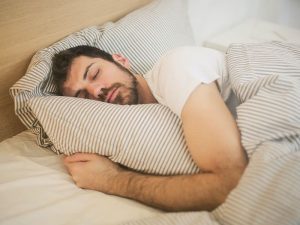Tips and Tricks for a Better Night’s Sleep
“Happiness consists of getting enough sleep. Just that, nothing more.” – Robert A. Heinlein
Okay, happiness may be more than just getting enough sleep, but it certainly is essential to your overall well-being. Good sleep can help to reduce stress, improve your memory, reduce inflammation, increase creativity, improve your stamina, and sharpen your focus.

But when you’re not sleeping well, you definitely know it. You may find yourself fatigued, grouchy, and even experiencing weight gain. And nobody really wants those things! But how do you go about getting a better night’s sleep? Here are a few ideas that may help.
- Set a Sleep Schedule and Stick to It: If you keep an irregular sleep schedule, that may be hurting your sleep. Even if you keep a set schedule during the week, but stay up late and sleep in late on the weekends, that could be disrupting your sleep. It’s best to keep a set schedule – seven days per week. Try to go to bed close to the same time each night and set your alarm to get you up at a similar time each day.
- Relax Before Bed: Do you feel like you are going, going, going until the minute you fall into bed each day? You’re not alone. People are just busy and may have little time to relax. But if you don’t take the time to relax before bed, you may find that your mind and body never quite “shut down” and you have difficulty falling asleep and staying asleep. Try to find an activity that helps you unwind before bed. Perhaps a hot bath, some time spent reading, or a little meditation can do the trick.
- Exercise: Finding time to exercise each day is also helpful for a good night’s sleep. Studies have shown that exercise improves your sleep quality and sleep duration, along with reducing stress and anxiety (which may be preventing you from a sound sleep).
- Decrease Your Exposure to Blue Light in the Evening: TVs, computers, laptops, smartphones, tablets, and other electronic devices all emit blue light – a light that essentially makes your brain feel like it’s daytime. You can imagine how this would be problematic for your sleep. A simple recommendation to help your sleep is to discontinue the use of electronics 1-2 hours before bedtime. Additionally, if you keep electronics in your bedroom, you might consider moving them to a different room or sleeping with a sleep mask.
- Avoid Caffeine Late in the Day: Caffeine does not affect everyone in the same way, but for some, it does disturb their sleep. If you find that drinking a cup of coffee after a certain time or enjoying a caffeinated soda “hypes” you up, then you need to establish a cut off time for these drinks.
- Avoid Alcohol and Late-Night Eating: Yes, both of these things can have a detrimental effect on your sleep. Try to avoid alcohol and late-night snacking so that you can sleep well.
- Don’t Nap: Occasionally, everyone needs a little catnap to get through the day. But if you find that you’re taking naps consistently and having trouble falling asleep at night, it may be time to give them up. This will help keep your sleep patterns regular and improve your sleep quality.
- Set Your Thermostat to Be Cooler at Night: If you’ve ever woken up in the middle of the night because you’re overheated, then it may be time to turn down the thermostat. Research has shown that cooler temperatures at night are more conducive to sleep, so be sure to set your thermostat to a temperature that may have you grabbing a blanket.
Don’t let a bad night’s sleep ruin your day or lead to continued poor sleep. Implement some of these ideas and, hopefully, soon you’ll wake up feeling rested and ready to go.







